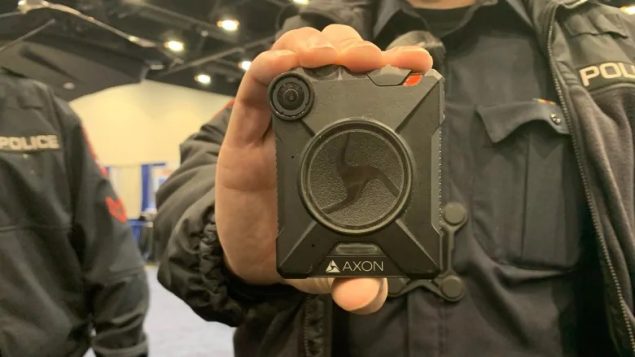Some police officers in Toronto will soon be wearing body cameras–the first phase of a plan that will see the force purchase 2,350 of them at a cost of $34.1 million over five years.
In a statement released Tuesday, the Toronto Police Service said all the cameras will be in use by the fall of next year and frontline officers will start using them in the northwest part of the city by the end of August.

A Calgary police officer holds up his Axon body-worn camera. Toronto is aiming to join Calgary as the second Canadian city to equip all its front-line officers with body cameras. The target date: fall of next year. (Helen Pike/CBC)
The decision met the approval of Toronto Mayor John Tory, who sits on the Police Services Board.
Tory said he was moved to vote in favour of the cameras, in part because reports on a pilot project found that they would improve community relations.
“Improved accountability is key to the rebuilding trust between police and communities,” Tory said.
“These cameras will be a valuable tool to help with that, though not the only one. I will be seeking tight rules on the operation of these cameras so that their purpose will be genuinely served.”
Later that month, Toronto city council voted in favour of a series of reforms that could alter the future of policing in the city, including the creation of a non-police response team for mental health calls and a mandate to require all officers to have body-worn cameras by 2021.
Watch: A Toronto police officer demonstrates how a body camera is supposed to work.
(Toronto Police Service video)
The reforms followed widespread protests in Canada–including in Toronto-– after George Floyd was killed in May when a Minneapolis officer pressed a knee against his neck for nearly eight minutes.
Demonstrators in Toronto also called for defunding local police, and highlighted the death of Regis Korchinski-Paquet, a Black woman who fell from her apartment’s balcony.
Ontario’s Special Investigations Unit, the province’s police watchdog, is investigating her death.
Up to now, the use of body cameras by police departments has been extremely rare in Canada.
Last year, the Calgary Police Service became the only major police force in the country that has equipped all its frontline officers with the cameras.

A member of the Vancouver Police Department wears a chest mounted camera as he oversees the take down of a tent city in Oppenheimer Park in downtown Vancouver on Oct. 16, 2014. (THE CANADIAN PRESS/Jonathan Hayward)
Fredericton, New Brunswick equipped a handful of its officers with body-worn cameras in 2018.
In June, the RCMP announced that some of its officers would beging wearing body cameras.
That announcement followed three days of anti-racism and anti-police brutality protests in cities across the country
It also followed the violent arrest of an Inuk man in Nunavut that was captured on video and charges by Athabasca Chipewyan Chief Allan Adam that RCMP officers beat and arrested him and manhandled his wife in a Fort McMurray, Alta. parking lot earlier this year.
Other police departments have tried body-camera pilot projects, but–so far–none have not put them into full service–for a variety of reasons, including costs as well as citing studies that concluded that body cameras have little impact on interventions, present logistical challenges and leave officers feeling as if they’re under surveillance.
With files from The Canadian Press, CBC News, RCI







For reasons beyond our control, and for an undetermined period of time, our comment section is now closed. However, our social networks remain open to your contributions.